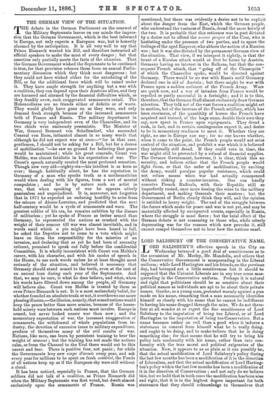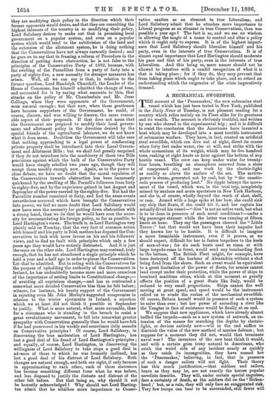LORD SALISBURY ON THE CONSERVATIVE NAME.
1-0RD SALISBURY'S effective speech in the City on 1 Wednesday betrayed a good deal of sensitiveness as to the accusation of Mr. Morley, Mr. Mundella, and others that the Conservative Government is masquerading in the Liberal uniform; while Lord Hartington and his friends, on the previous day, had betrayed not a little sensitiveness lest it should be supposed that the Unionist Liberals are in any true sense mas- querading in the Conservative uniform. Perhaps it is natural and right that politicians should be as sensitive about their political names as individuals are apt to be about their private names. Goethe, as a young man, protested warmly against a pun made on his name, remarking that a man necessarily identifies himself so closely with his name that he cannot be indifferent to having his name dragged through the mire. We do not there- fore at all wonder at or regret the fine sensitiveness of Lord Salisbury to the imputation of being too Liberal, or of Lord Hartington to the imputation of being too Conservative. But a name becomes rather an evil than a good when it induces a statesman to conceal from himself what he is really doing, and ought to be doing, and to make-believe that he is doing something else ; for that means that he will try to bring his policy into conformity with his name, rather than into con- formity with the true moral and political exigencies of the situation. Now, it appears to us as plain as it can possibly be, that the actual modification of Lord Salisbury's policy during the last few months has been a modification of it in the direction of Liberalism, and that the actual modification of Lord Harting- ton's policy within the last few months has been a modification of it in the direction of Conservatism ; and not only do we believe this, but we hold that in both cases the modification has been wise and right, that it is in the highest degree important for both statesmen that they should acknowledge to themselves that
they are modifying their policy in the direction which their former opponents would desire, and that they are consulting the highest interests of the country in so modifying their policy. Lord Salisbury desires to make out that in promising local government on a popular system, and even on a popular system which would tend to the subdivision of the land and the extension of the allotment system, he is doing nothing that the Conservatives have not always earnestly desired ; and he goes on to say that in framing a reform of Procedure in the direction of putting down obstruction, he is not false to the principles of the Conservative Party of 1882, because, with the swelling of the Parnellites from a party of forty into a party of eighty-five, a new necessity for stronger measures has arisen. Well, all we can say is that, in relation to the former question, Lord Randolph Churchill, the Leader of the House of Commons, has himself admitted the change of tone, and accounted for it by saying what amounts to this, that attacks on the policy of Mr. Chamberlain and Mr. Jesse Collings, when they were opponents of the Government, were natural enough ; but that now, when these gentlemen have become supporters of the Government, he could, of course, discern, and was willing to discern, the more reason- able aspect of their proposals. If that does not mean that the Government are prepared to modify their local govern- ment and allotment policy in the direction desired by the special friends of the agricultural labourer, we do not know what it does mean. Doubtless the Government will take care that nothing approaching to a legal power of confiscating private property shall be introduced into their Local Govern- ment and Allotment Bills ; but we shall feel greatly surprised if they do not introduce into the machinery of these two Bills provisions against which the bulk of the Conservative Party would have simply rebelled two years ago, though they will accept them meekly enough now. Again, as to the power to close debate, we have no doubt that the moral repulsion of the Conservatives towards obstruction has been immensely -quickened by the swelling of Mr. Parnell's followers from forty to eighty-five, and by the experience gained in last August and September of the power exerted by the eighty-five. But had the Parnellite number remained at forty, and had the same events nevertheless occurred which have brought the Conservatives into power, we feel no more doubt that Lord Salisbury would now have seen the necessity for putting down obstruction with a strong hand, than we do that he would have seen the neces- sity for accommodating his foreign policy, so far as possible, to Lord Hartington's views. The truth is, as Lord Hartington very plainly said on Tuesday, that the very fact of common action with himself and his party in Irish matters has disposed the Con- servatives to look with more favour on his and his followers' views, and to find no fault with principles which only a few years ago they would have entirely distrusted. And it is just the same on the other side. Lord Hartington may contend, truly enough, that he has not abandoned a single principle which he held a year and a half ago in order to please the Conservatives. Let that be admitted. But in acting with the Conservatives for the purpose of upholding the authority of the Government in Ireland, he has undoubtedly become more and more conscious of the importance of setting limits to Constitutional change,— of avoiding all capricious change,—and has so contracted a somewhat more decided Conservative bias than he felt before ; witness, for instance, his hearty support of the Government in rejecting even Mr. John Morley's suggested compromise in relation to the winter ejectments in Ireland, a rejection which we at least did not think it possible in September to justify. What is more natural, what more excusable, than for a statesman who is standing in the breach to resist a great revolutionary movement, to fall into somewhat greater sympathy with Conservatism generally than he would have felt if he had persevered in his weekly and sometimes daily assaults on Conservative principles ? Of course, Lord Salisbury, in discovering the true moderation of Lord Hartington, has lost a good deal of his dread of Lord Hartington's principles ; and equally, of course, Lord Hartington, in discovering the willingness of Lord Salisbury to take steps a good deal in advance of those to which he was formerly inclined, has lost a good deal of his distrust of Lord Salisbury. Both changes are natural enough, and both are right, if only because in approximating to each other, each of these statesmen has become something different from what he was before, and less disposed to justify the distaste and distrust of the other felt before. But that being so, why should it not be honestly acknowledged ? Why should not Lord Harting- ton admit that he attdalies more importance to Conser- vative caution as an element in true Liberalism, and Lord Salisbury admit that he attaches more importance to Liberal progress as an element in true Conservatism, than was possible a year ago ? The fact is so, and we see no wisdom in allowing the magic of a name to control and alter a policy which it ought only to express. It is of the highest import- ance that Lord Salisbury should liberalise himself and his party, even in the interests of true Conservatism. It is of almost equal importance that Lord Hartington should moderate his pace and that of his party, even in the interests of true Liberalism. And this being so, mere names should not be allowed to interfere with a candid recognition of what it is that is taking place ; for if they do, they may prevent that from taking place which ought to take place, and so retard an understanding which the exigencies of the crisis imperatively demand.

















































 Previous page
Previous page